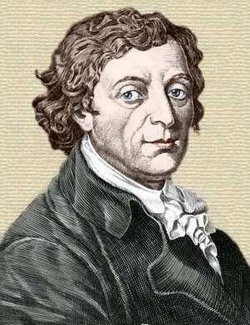Dr Franz Carl Achard (Franz Karl Achard)

Achard was born in Berlin, the son of preacher Max Guillaume Achard, descendant of Huguenot refugees and his wife Marguerite Elisabeth (Rouppert). He studied physics and chemistry in Berlin. He became interested in sugar refining through his stepfather. At the age of 20, Achard entered the “Circle of Friends of Natural Sciences” and met Andreas Sigismund Marggraf, then director of the physical classes at the Royal Academy of Sciences. Achard studied many subjects, including meteorology, evaporation chillness, electricity, telegraphy, gravity, lightning arresters, and published in German and French. Achard was a favorite of King Frederick II of Prussia, and directly reported to the King on his research twice a week. About a study on the influence of electricity on mental capabilities, Frederick II was reported to have said: If he is able to provide reason for the half wits in my Prussian states using electricity, then he is worth more than his own weight in gold.
In 1776 Achard was elected to the Royal Academy of Sciences at Berlin. Following the death of Marggraf in 1782, Archard went on to become the director of the physical classes of the academy. In 1782 he was elected a foreign member of the Royal Swedish Academy of Sciences. For his discoveries in the acclimatisation of tobacco to Germany, the king granted him a lifetime pension of 500 taler. Achard was also esteemed by Frederick William II of Prussia.
Achard revived the discovery by Marggraf in 1747 that sugar beets contained sugar, and devised a process to produce sugar from sugar beets. Beginning in 1789, he planted various sugar-bearing plants on his manor in Kaulsdorf near Berlin. Because of their efficiency, he soon preferred sugar beets. In the following year he studied different varieties of beets and the influence of fertilisers. The research was interrupted when Kaulsdorf manor burnt down and had to be sold. Achard later continued on the manor Französisch Buchholz.
In 1801, with the support of King Friedrich Wilhelm III, he opened the first sugar beet refinery at Gut Kunern near Steinau[3] Silesia, Prussia. In 1802, the refinery processed 400 tons of beets with a degree of efficiency of 4%. Other refineries were soon built by his students Johann Gottlob Nathusius and Moritz, Freiherr von Koppy. In 1806 Achard’s plant was burned down by Napoleon’s war and in 1810 it was rebuilt on a small scale. Embargoes by Napoleon kept cane sugar imports away from Germany and thus the growing and refining of sugar beets became highly important for the Prussian government. Refineries also appeared in Bohemia, Augsburg and in 1811 in France. France itself built many refineries and was only in later years surpassed by Prussia.
English sugar merchants offered Achard 200,000 taler to declare his experiments a failure but he refused. With Achards discovery, sugar was no longer a luxury product, but became a necessity, due to the embargoes. Achard taught classes to have a large number of sugar beet growers and the specially developed sugar beets became available for everyone. In 1794, Achard built an optical telegraph between Spandau and Bellevue. This device had been invented just one year before by Claude Chappe.
Due to Archard’s financial difficulties as a result of several fires in 1806, his refineries were declared bankrupt in 1815. He died, destitute, in 1821 in Wohlau. His life’s work was carried on mainly by French industrialists such as at the refineries of Matthias Christian Rabbethge. In mid 19th century America, Achard’s grandson Anton William Waldemar Achard successfully promoted beet sugar production in Michigan according to a later descendant, Emil Lockwood,[5] son of Mabel Pauline Achard.
Born
- April, 28, 1753
- Berlin, Germany
Died
- April, 20, 1821
- Dolnośląskie, Poland
Cemetery
- Moczydlnica Dworska Old Cemetery
- Dolnośląskie, Poland

